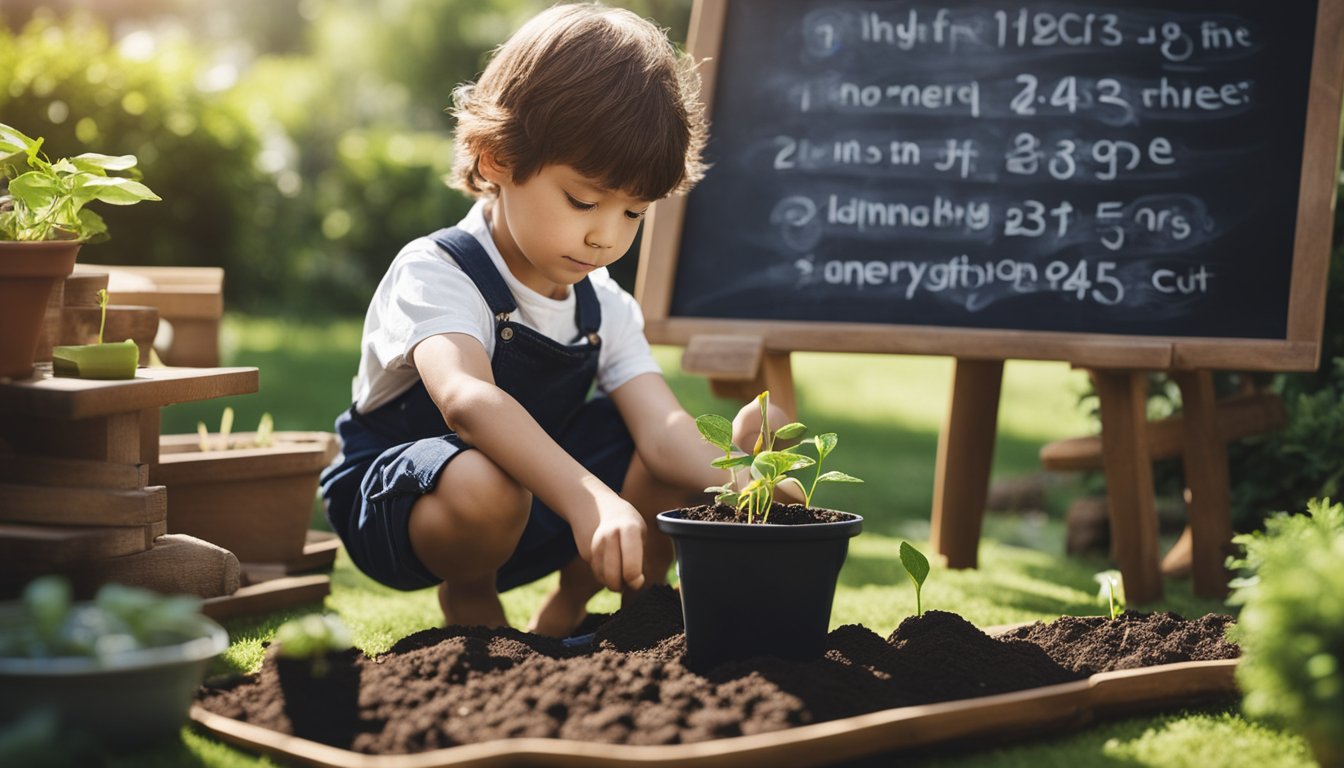Late updated: 20 Apr 2025 09:04
Written by:
How To Encourage A Growth Mindset In Children: Effective Strategies for Parents and Educators
A growth mindset in children can open doors to a world of opportunities and achievements. It's all about fostering the belief that abilities and intelligence can be developed through dedication and hard work. By encouraging a growth mindset, we can help children become more resilient in the face of challenges and more open to learning and creativity.

This approach not only benefits children academically but also nurtures their emotional and social development. We can inspire young minds by modelling a love of learning and showing that setbacks are not failures but learning experiences. Engage them in discussions about times when they or someone they admire overcame obstacles, which can cultivate this mindset.
Our role is to create an environment where children feel safe to take risks and explore their potential. By celebrating effort and persistence over pure talent, we help them appreciate the value of perseverance. Encouraging a growth mindset sets the foundation for lifelong success and satisfaction.
Key Takeaways
- Growth mindset helps children embrace challenges.
- Modelling resilience teaches children valuable lessons.
- Focus on effort and persistence to nurture development.
Understanding Growth Mindset in Children
Fostering a growth mindset in children empowers them to embrace challenges, persist through difficulties, and see failures as opportunities for learning. It's essential to differentiate between growth and fixed mindsets while recognising the profound impact that adopting a growth mindset can have on children's development and success.
What Is a Growth Mindset?
A growth mindset, a concept introduced by psychologist Carol Dweck, refers to the belief that intelligence and abilities can be developed through dedication and hard work. In this mindset, children's potential is not seen as static but rather as something that can be cultivated.
Kids with a growth mindset see challenges as opportunities to grow and are more resilient in the face of setbacks.
They understand that effort plays a crucial role in achieving success. This perspective promotes a love for learning and motivates children to improve their academic performance and personal skills.
Growth Mindset Versus Fixed Mindset
The distinction between a growth mindset and a fixed mindset is pivotal in understanding how children's attitudes towards learning and achievement can differ. A fixed mindset assumes that intelligence and abilities are innate and unchangeable. Children with a fixed mindset may avoid challenges, give up easily, and feel threatened by others' success.
Conversely, a growth mindset encourages a focus on effort and perseverance. It fosters resilience and a willingness to try new things. Children's attitudes and responses to challenges are profoundly influenced by which mindset they hold.
Teaching kids to adopt a growth mindset can help them overcome underachievement and unlock their full potential.
Why Growth Mindset Matters for Kids
Instilling a growth mindset in children is vital for their education and personal development. This mindset supports the idea that they can continually learn and improve, regardless of current abilities. When children believe they can grow, they are more likely to engage in activities that challenge them and develop their skills.
Academic performance tends to improve as children embrace a growth mindset. They become more enthusiastic about learning and less fearful of making mistakes. This environment encourages exploration and innovation.
Recognising the impact of a growth mindset can help us guide children towards becoming self-motivated and resilient individuals. Promoting this perspective is an investment in their future success.
Effective Ways to Cultivate a Growth Mindset in Children

Fostering a growth mindset in children involves creating an environment that values effort, resilience, and continuous learning. It's essential to approach challenges with a positive attitude and teach children to view setbacks as opportunities for growth.
Modelling a Growth Mindset as Adults
As adults, it's crucial that we model a growth mindset in our daily lives. By discussing our own experiences of overcoming challenges and reflecting on what we've learned, we teach children the importance of resilience and persistence.
Sharing personal stories of success resulting from hard work and effort can be incredibly effective. We can also demonstrate how to embrace mistakes and learn from them, showing children that failure is a natural part of the learning process.
By approaching hurdles with curiosity and a love for learning, we create an atmosphere of openness and growth. Encouraging children to maintain a growth mindset journal or reflect on growth mindset quotes can reinforce these concepts.
Encouraging Effort, Hard Work, and Perseverance
Emphasising effort and hard work over innate ability is key to nurturing a growth mindset. We can praise children for their dedication and incremental progress, reinforcing their perception of success as a result of persistence.
Encouraging manageable steps towards ambitious goals helps to build motivation and confidence. By setting a positive attitude towards overcoming challenges, we instil in children the belief that improvement is always possible.
Activities that invite perseverance, such as puzzles or learning a new skill, provide valuable opportunities for growth. We must nurture their resilience to keep trying even when faced with setbacks.
Promoting Positive Praise and Constructive Feedback
Feedback plays a crucial role in cultivating a growth mindset. Positive praise directed at effort, rather than ability, motivates children to keep trying and to view challenges as stepping stones to success.
Constructive feedback, focussing on specific areas for improvement, guides children’s learning process without discouraging them. We should model how to accept feedback with grace and use it as a tool for self-reflection and growth.
Highlighting the "power of yet" mindset—such as “You haven't mastered this skill yet”—inspires continued effort. This approach maintains a focus on potential, rather than existing limitations.
Creating Opportunities for Learning and Embracing Mistakes
Creating a culture that views errors as learning opportunities is vital for growth mindset development. We should encourage experimentation in a safe environment where mistakes are seen as a part of the journey.
Offering children a variety of resources and challenges fosters curiosity and engagement. By creating spaces for open competition and discussion, we enable children to learn from one another.
Facilitating an environment where questions and risks are welcomed encourages a positive attitude towards learning. This approach builds confidence and emotional development, essential components in cultivating an enduring growth mindset.
Frequently Asked Questions

Encouraging a growth mindset in children involves various strategies both in educational settings and at home. Teachers and parents can employ specific methods, activities, and approaches to nurture this mindset. Feedback, an essential factor, plays a significant role in this developmental process.
What strategies can teachers employ to foster a growth mindset in students?
Teachers can promote a growth mindset by encouraging students to embrace challenges and view them as opportunities to learn. They should create a supportive environment where making mistakes is part of the learning process, and they can use praise focused on effort and strategy rather than inherent ability.
Could you provide examples that demonstrate a growth mindset in an educational setting?
In classrooms, a growth mindset is visible when students willingly tackle challenging problems and use feedback to improve. They might participate in group discussions where they reflect on their learning methods and progress, asking questions like, "What did I learn today that was challenging?"
In what ways can parents facilitate the development of a growth mindset at home?
Parents can nurture a growth mindset at home by encouraging children to try new activities without fear of failure. Conversations about effort and persistence can help children understand that intelligence and abilities develop through hard work and dedication. Parents can model this mindset by sharing their learning experiences.
What are some effective growth mindset activities suitable for children?
Activities such as puzzles, problem-solving games, and role-playing scenarios encourage a growth mindset. These activities teach children how to approach challenges methodically and develop resilience and perseverance. Additionally, storytelling sessions where children discuss characters' challenges and solutions can further support this mindset.
How can educators integrate growth mindset principles into their teaching methodologies?
Educators can integrate growth mindset principles by designing lessons that challenge students but are achievable with effort. Promoting peer learning where students collaborate and learn from each other is another effective method. Incorporating self-reflection exercises helps students recognise their growth and areas for improvement.
What role does feedback play in cultivating a growth mindset among young learners?
Feedback is crucial in cultivating a growth mindset because it guides children on how to progress. Constructive feedback that focuses on effort and strategies encourages students to persist and learn from their experiences. It reassures them that improvement is possible and builds their confidence in tackling future challenges.
